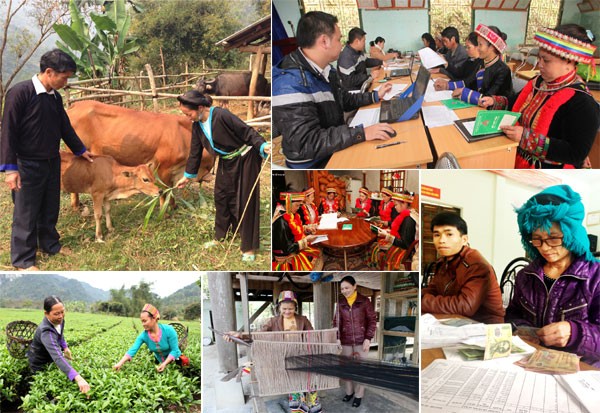(VOVWORLD) - In October 2021 the Prime Minister adopted a National Target Program for Socio-Economic Development in Ethnic Minority and Mountain Areas until 2030. The Committee for Ethnic Affairs has been working closely with localities nationwide to review the implementation of the program and seek ways to enhance the development of ethnic minority regions.
 Investment in ethnic minority regions continues (Photo: chinhphu.vn) Investment in ethnic minority regions continues (Photo: chinhphu.vn) |
The National Target Program for Socio-Economic Development in Ethnic Minority and Mountain Areas in the 2021-2030 period sets specific goals for rural transport development and filling urgent needs for residential land, housing, production land, water for daily use and livelihoods for ethnic minorities. The program supports for vocational training, job creation, preservation of intangible cultural values, promotion of community culture, and investment in tourism.
People’s spiritual life is improved
After nearly 3 years, the program has contributed greatly to realizing local socio-economic development targets. Resources have been focused on essential infrastructure to improve people’s livelihood in disadvantaged, ethnic minority, and mountain regions. Investment and incentives in production development have raised people's incomes. Much attention has been paid to the preservation and promotion of national cultural identity. The poverty rate has fallen sharply. Significant improvement has been reported in vocational training, job creation, health care, and education.
Trieu Van Huan, Secretary of the Party Committee of Muong Lai commune, Luc Yen district, Yen Bai province, said: "We have mobilized the people to bring into play their internal strength and resources and have supported them in vocational training and job replacement. We have helped them apply economic models in livestock production, agricultural production, and afforestation. We have particularly focused on disadvantaged families and mobilized social resources to build houses for the poor."
More than 240 million USD has been transferred to 19 cities and provinces in the north between 2021 and May 2023. By the end of this year, more than 99% of communes will have cement or asphalt roads, more than 90% will have brick schools, 92% will have medical stations, and 98.6% will have access to the national grid or other power sources. Nearly 55% of people of working age will have vocational training and nearly 93% of children under five will go to kindergartens. 92% of villages will have community houses.
Efforts strengthened to realize the program’s goals
Minister and Head of the Committee for Ethnic Affairs Hau A Lenh said the National Target Program on Socio-Economic Development for Ethnic Minority and Mountain Areas is of special importance. It aims to boost comprehensive socio-economic development, ensure national defense and security, consolidate the Party and the political system, strengthen national unity, and enhance public trust in the Party and State.
Mr. Lenh urges provincial committees for ethnic affairs to work closely with provincial People’s Committees to effectively implement the program.
"We need to engage district and communal officials. The province should handle the program within their authority instead of waiting for support from the central level. Localities need to work together and share experience and information. The provincial Committees for Ethnic Affairs need to closely follow the implementation of the program and make monthly reports to the Central Committee,' said Mr. Lenh.
At the end of last year there were 3,434 ethnic minority and mountain communes in 53 cities and provinces. Most policies on ethnic affairs have been integrated into the national target program.
Conferences to review 3-year implementation of the 10-year program have provided ideas to make the program more effective. These ideas have been integrated into the implementation of other national target programs toward sustainable development of ethnic minority regions in Vietnam.